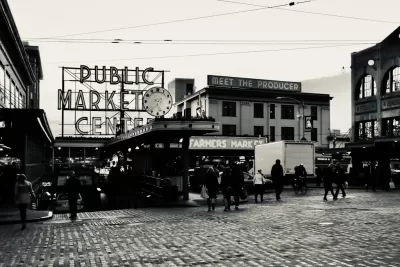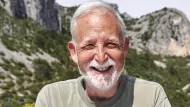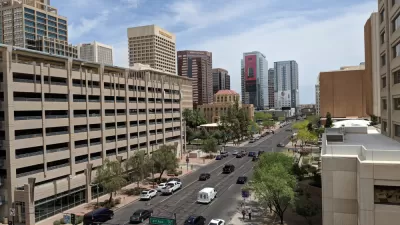In his recent analysis of trends to watch for 2023, Managing Editor James Brasuell noted how ChatGPT might replace all the writers of Planetizen, and more. Chuck Wolfe decided to take literally Brasuell's “don't let it sneak up on you” admonition.

After answering some interview questions from a Geekwire reporter about my hometown’s ongoing recovery, I asked the Bing Chatbot to write an Op-Ed based on the content of my books and associated ideas. It created an eerie parallel dimension full of familiar phrases and things and gave life to a new branch of government.
Maybe another chatbot is listening, and together they can make a difference as the city evolves. As the Chatbot would ask, “what do you think?”
The bot speaks:
Seattle is a vibrant and diverse city with much to offer its residents and visitors. However, like many other urban centers, it faces serious challenges threatening its livability and prosperity. Rising crime rates, homelessness, gentrification, climate change, and a pandemic-induced economic downturn are among them. These issues are especially acute in the downtown area, which is the heart of the city’s tourism and convention business and a cultural and civic hub.
To address these challenges, city leaders need to understand Seattle's downtown issues in context through a comprehensive framework for creating more livable, sustainable, and resilient cities. This framework involves observing and learning from what works in existing urban environments, engaging with diverse perspectives and experiences of city dwellers, and preserving and enhancing the distinctive qualities that make each city unique.
Based on this framework, I propose some novel ideas for regenerating downtown Seattle into a safe, dynamic, and inclusive commercial and sociocultural center for the region:
- Create more public spaces that invite spontaneous interactions, social activities, and cultural expressions. For example, convert some parking lots or vacant buildings into pocket parks or pop-up art galleries; expand sidewalks or bike lanes to encourage walking or cycling; install benches or tables where people can sit and chat; organize street festivals or markets that showcase local talents or products.
- Implement more participatory planning processes that involve residents, businesses, community groups, and other stakeholders in shaping the future of downtown. For example, use digital tools or platforms to collect feedback or suggestions from different population segments; host workshops or forums where people can share their visions or concerns; create advisory committees or task forces that represent diverse interests or backgrounds.
- Promote more mixed-use development integrating housing, commerce, culture, and recreation. For example, encourage affordable housing projects or co-living spaces that cater to different income levels or lifestyles; support local businesses or entrepreneurs that offer innovative services or products; facilitate cultural exchanges or collaborations between different ethnic groups or artistic disciplines;
provide recreational facilities or amenities that appeal to different age groups or preferences.
These ideas are inspired by some successful examples from other cities around the world, such as:
- Copenhagen’s Superkilen Park, which features elements from 60 different countries, reflecting the diversity of its neighborhood;
- Barcelona’s Superblocks, which reduce car traffic and increase pedestrian space, creating more livable streets;
- Singapore’s Kampong Glam, preserves its historic character and fosters its creative scene, attracting both locals and tourists.
To implement these ideas effectively, I recommend appointing a new Office of Regeneration and Recovery, which would be responsible for:
- Coordinating with various departments, agencies, and partners on downtown revitalization initiatives;
- Developing strategies, policies, and programs that support downtown regeneration goals;
- Monitoring progress, evaluating outcomes, and reporting results of downtown regeneration efforts;
- Communicating with stakeholders, media, and the public on downtown regeneration issues.
The leadership team within the Office of Regeneration and Recovery should have:
- A strong background in urban planning, design, or development;
- A proven track record of leading complex projects involving multiple actors;
- A deep understanding of Seattle’s history, culture, and challenges;
- A vision for Seattle’s future potential as a global city.
If adjusted to other contexts, this agenda might serve as a template for other cities encountering similar challenges.

Maui's Vacation Rental Debate Turns Ugly
Verbal attacks, misinformation campaigns and fistfights plague a high-stakes debate to convert thousands of vacation rentals into long-term housing.

Planetizen Federal Action Tracker
A weekly monitor of how Trump’s orders and actions are impacting planners and planning in America.

In Urban Planning, AI Prompting Could be the New Design Thinking
Creativity has long been key to great urban design. What if we see AI as our new creative partner?

King County Supportive Housing Program Offers Hope for Unhoused Residents
The county is taking a ‘Housing First’ approach that prioritizes getting people into housing, then offering wraparound supportive services.

Researchers Use AI to Get Clearer Picture of US Housing
Analysts are using artificial intelligence to supercharge their research by allowing them to comb through data faster. Though these AI tools can be error prone, they save time and housing researchers are optimistic about the future.

Making Shared Micromobility More Inclusive
Cities and shared mobility system operators can do more to include people with disabilities in planning and operations, per a new report.
Urban Design for Planners 1: Software Tools
This six-course series explores essential urban design concepts using open source software and equips planners with the tools they need to participate fully in the urban design process.
Planning for Universal Design
Learn the tools for implementing Universal Design in planning regulations.
planning NEXT
Appalachian Highlands Housing Partners
Mpact (founded as Rail~Volution)
City of Camden Redevelopment Agency
City of Astoria
City of Portland
City of Laramie






























